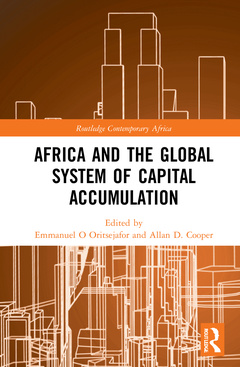Description
Africa and the Global System of Capital Accumulation
Routledge Contemporary Africa Series
Language: English
Subjects for Africa and the Global System of Capital Accumulation:
Keywords
Primitive Accumulation; Unfree Labor; Africa's rich resources; Concession Agreements; Global capitalist economy; Aliko Dangote; Russia–Africa relations; South Sudan; Billionaire Club; Chinese Government; Gdp Growth; Diamond Trading Company; UN; UNITA; De Beers; Odious Debts; Southern Somalia; Spatio Temporal Fix; AfDB; West African Cocoa; Predatory Accumulation; President Mobutu; Joint Development Zone; AMISOM Force; EITI; SWAPO Leader; President Nujoma; Gdp Growth Rate
Publication date: 05-2023
· 15.6x23.4 cm · Paperback
Publication date: 05-2021
· 15.6x23.4 cm · Hardback
Description
/li>Contents
/li>Readership
/li>Biography
/li>
Africa and the Global System of Capital Accumulation offers a groundbreaking analysis of the strategic role Africa plays in the global capitalist economy.
The exploitation of Africa?s rich resources, as well as its labor, make it possible for major world powers to sustain their authority over their own middle-class populations while rewarding African collaborators in leadership positions for subjecting their populations into poverty and desperation. Middle-class obsessions such as computers, mobile phones, cars and the petroleum that fuels them, diamonds, chocolate ? all of these products require African resources that are typically obtained by child or slave labor that helps to generate billionaires out of foreign investors while impoverishing most Africans. Oritsejafor and Cooper demonstrate that "primitive accumulation," believed by both Adam Smith and Karl Marx to be a process that precedes capitalism, is actually an integral part of capitalism. They also validate the thesis that capitalism incorporates racism as an organizing tool for the exploitation of labor in Africa and on a global scale. Case studies are presented on Nigeria, Cote d?Ivoire, Ghana, Liberia, Congo, Tanzania, Somalia, Angola, Namibia, Sao Tome and Principe, and South Sudan. There are also chapters analyzing the interests of Russia and China in Africa.
This book will be of interest to students and scholars of African politics, development, and economics.
1.The Role of Primitive Accumulation and Racism in Capitalist Systems 2.Cocoa in Cote d’Ivoire and Ghana: Chocolate and Neoliberal Capitalism 3.Capital Accumulation in Liberia’s Rubber and Iron Ore Sectors 4.The Congo Paradox: Accumulation Crisis and Resilience in the Democratic Republic of the Congo 5.From Unfree Labor to Neo-Colonial Extraction in Sao Tome and Principe 6.Russia’s Return to Africa: Much ado but about what? 7.Diamonds in Africa and the Continuing Cold War: A Case Study of Building a Capitalist Ruling Class in Namibia 8.Profiting from the Conflict in Mogadishu: Capital Accumulation in the Failed State of Somalia 9.Benefiting a Few: Oil Rents in South Sudan 10.Angola’s Transition From War to Economic Powerhouse 11.Capitalism and Africa’s (Infra)Structural Dependency: A Story of Spatial Fixes and Accumulation by Dispossession 12.Wealth Accumulation and the Nigerian Billionaire Club: The Case of Aliko Dangote 13.Tanzania Can Feed Africa: Potentials and Challenges 14.Conclusion: Odious Debts of the African Capitalist State
Emmanuel O. Oritsejafor is Chair of the Political Science Program at North Carolina Central University, USA.
Allan D. Cooper is Professor of Political Science at North Carolina Central University, USA.




